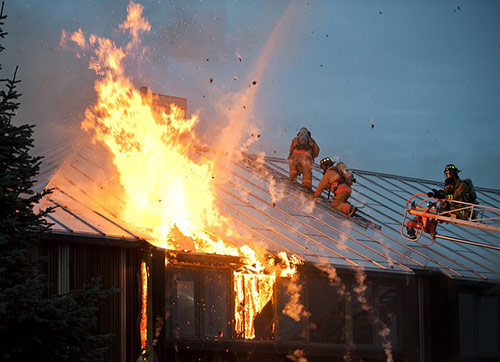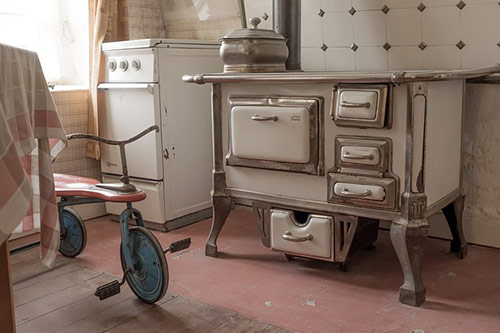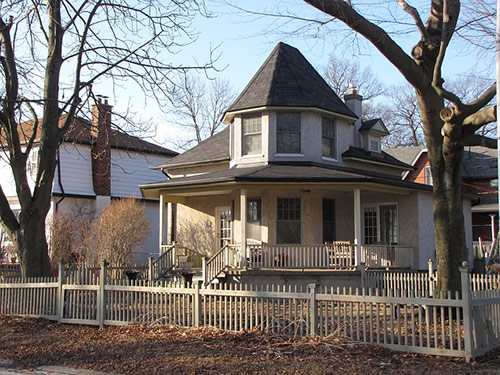Home Features That Can Make Homeowners Insurance More Expensive
Uncover the intricate relationship between home features and insurance premiums. Gain insights into how specific aspects of your home can significantly impact the cost of your coverage. Make informed decisions about homeowners insurance based on a thorough understanding of these influential factors. Protect your home and finances with the right knowledge.
Read more Secured with SHA-256 Encryption





Table of Contents
Table of Contents


Professor of Nutrition & Kinesiology
Melissa Morris has a BS and MS in exercise science and a doctorate in educational leadership. She is an ACSM certified exercise physiologist and an ISSN certified sports nutritionist. She teaches nutrition and applied kinesiology at the University of Tampa. She has been featured on Yahoo, HuffPost, Eat This, Bulletproof, LIVESTRONG, Toast Fried, The Trusty Spotter, Best Company, Healthl...
Melissa Morris


Licensed Insurance Agent
Brad Larson has been in the insurance industry for over 16 years. He specializes in helping clients navigate the claims process, with a particular emphasis on coverage analysis. He received his bachelor’s degree from the University of Utah in Political Science. He also holds an Associate in Claims (AIC) and Associate in General Insurance (AINS) designations, as well as a Utah Property and Casual...
Brad Larson
Updated January 2025
Welcome to our comprehensive guide on home features that can affect your homeowners insurance premiums.

In this article, we delve into the key factors that can make your insurance more expensive, such as swimming pools, trampolines, old electrical wiring, and proximity to natural disaster-prone areas.
We also discuss how the age of your home, the quality of its construction, and the presence of security systems can impact your insurance costs. By understanding how these features and factors influence your coverage expenses, you can make informed decisions to protect your home and budget effectively.
To ensure you’re getting the best insurance rates available for your specific circumstances, enter your ZIP code below and compare quotes from top-rated insurance providers in your area. Safeguard your home and save money today!
Read more: Home Insurance: A Complete Guide
Here are some of the most popular features that increase home insurance costs:
Finished Basement
A finished basement adds more liveable square footage to the home, but it also stands a higher chance of getting damaged in the case of a flood. Even if the basement is not likely to flood from natural causes, a burst pipe or backed up sewage could damage this area.
Pool
Pools are a great way to relax and cool off in the summer sun, but they are also a big liability. Not only is there a higher chance that someone in your own family could become injured, but pools tend to attract a crowd, adding further liability. Fun extras like a diving board or slide could mean even higher insurance premiums, but safety fences and alarm systems might help keep costs down.
Hot Tub
Similar to a pool, a hot tub can make you more vulnerable to lawsuits and are many times considered a liability by insurance companies. Additionally, the value of the hot tub can increase the coverage you need for your home which would lead to higher rates.
Oil Heating
Many older homes were built with an oil heating system and some people prefer this to forced air heat. Insurance companies aren’t fans, though. If you’ve got an oil tank on your property, you have a large amount of a highly flammable substance. A leaking tank could also mean big environmental damage. Converting to a different style will lower premiums.
Flood Zone
Certain homes are located in flood zones because they are near areas that could quickly become flooded. It’s a big risk. Some insurance companies will refuse to insure homes that are in a flood zone or may specifically exclude flood damage from the policy. Flood insurance is a costly add-on.
Sump Pump
A sump pump can actaully help protect your home from flooding but it is typically advised that you should add a sump pump failure rider or endorsement to your homeowners coverage in the event that your sump pump fails.

Distance from Emergency Services
A house in the country may give you the peace and quiet you’re after, but it does have at least one negative factor & the distance from emergency services. If your home catches on fire and the fire department is several miles away, they could be too late by the time they get to your home. Insurance companies recognize this and charge you extra for the possibility that they may have to pay for more extensive damages.
Outdated Electrical Systems
Older homes have older electrical systems. Not only are these wires more likely to cause a fire, but they’re also not always able to handle the amount of electricity the average homeowner uses these days. If you’re looking at a home with an outdated electrical system, consider having it updated, especially as it’s part of a 4-point home insurance inspection. It will reduce your insurance costs and make your home a lot safer.
Wooden Shake Roof
Wooden shakes give a home a unique look that many homeowners find attractive. If kept in good condition, they can last longer than other styles of roof. Unfortunately, they’re also more prone to damage from wood rot or mold and will not resist fire. Expect to pay more for your insurance if the home has this type of roof.
Custom Work
Intricately carved banisters or specially designed cabinets may be a big draw to a particular home. Unfortunately, the insurance company will see only things that are incredibly expensive to replace. If the fixtures in your home can’t be easily bought by a local contractor, expect to pay a bit more if you want things replaced as they are.

Extensive Landscaping
A beautifully landscaped property takes a lot of time and money to maintain. Insurance policies will generally cover some of the home’s landscaping, but it may not cover it all. For instance, old trees simply can’t be replaced. Be sure to ask the insurance agent about what types of landscaping elements the policy will cover.
Read more: Best Business Insurance for Landscaping Companies
Galvanized or Lead Piping
Found in older homes, galvanized or lead piping is more corrosive and more likely to leak. This higher potential for water damage means higher premiums. You could probably mitigate some this effect by replacing the pipes with more modern versions.
Period Details
Older homes have a lot of character & and a lot of elements that are difficult to replace in modern society. From wider floor boards to period door knobs, the cost to re-create the look of an older home can be significantly more expensive. Some companies won’t even offer policies on this type of home.
Building Material
Though it’s not always something that’s in your control, the material a home is made from can have an effect on the cost of insurance. Homes with wooden frames are more likely to burn if there’s a fire, so they will cost more to insure. A brick or concrete home could be less.

Fireplaces or Wood Burning Stoves
Even though you may intend to use your fireplace or wood burning stove correctly, simply having a fire means that there are more chances for damage. If the house has either of these features, you may be saving money on heating, but spending more on insurance.
Poor Maintenance
A home that isn’t well-maintained can be at greater risk for damages. If the assessor notices an older roof with shingles curling at the edges or parts of the home that seem to have structural damage, you’ll find that your insurance rates start to go up. Making necessary repairs can easily fix this problem.
House Size
A bigger home isn’t always better, especially when it means higher insurance costs. When looking at a home, you want to be sure that it makes good use of the space it has. Sometimes, a home that’s 1,500 square feet can seem bigger than a 2,000 square foot home and it will be a lot less expensive to insure.
Decks
While you may not consider a deck as livable space, an insurance company will take it into account when determining the cost to rebuild, repair or replace your deck in the even of a claim. The additional coverage you need for a deck will add to your monthly premium.

Age of Home
Older homes often have more problems than newer ones, even if they’ve been well maintained. Things are just more likely to wear out. Insurance companies make up for this by charging those with older homes more.
Area of Country
If you live in an area of the country that has a greater chance of experiencing a natural disaster, expect to pay more money for insurance. This is true with you live along the San Andreas fault line or Tornado Alley. Harsh weather means more insurance claims.
Prior Claims
Surprisingly, insurance companies share information about how many claims have been filed on a particular home through the Comprehensive Loss Underwriting Exchange (CLUE). Even if these claims were filed by the previous owner, it could mean that you end up paying more than you would for a different home.
The Neighborhood
Homes that are in neighborhoods that experience more claims, particularly due to theft, will face higher premiums. You might go into a home knowing that there’s a high theft rate in the area, but a good neighborhood could suddenly start to see a rash of break-ins. Home alarm systems can make a difference in insurance costs.
Other Items to Consider
Additionally, there may be some features that don’t come with the home, but you bring with you. These items may be more within your control, but can also increase what you pay for homeowners insurance.
In-Home Businesses
If you do business on your property, you probably have more at stake. Whether you’re running an in-home daycare or an accounting business, having extra people coming in and out of your home means that there’s a greater chance someone could become injured. A separate policy for your business may be necessary. You should consider looking for the best business insurance for daycares, or any insurance to cover your specific business when you are doing it in your actual property.
Business Inventory
Even if you’re not running a business that has customers coming to your home, you could still face higher premiums if you keep any of your business’ inventory on the property. For instance, if you have a craft business, you’ll want to be sure that all of your supplies could be replaced if they are stolen or damaged.

Trampolines and Fun Kid Stuff
Trampolines cause thousands of injuries each year, and if a neighborhood kid gets hurt on your trampoline, you could be facing increased premiums. Trampolines aren’t the only dangerous things, either. Large play structures, skate ramps, or other such things can also be expensive to insure.
Fine Jewelry
Whether you have grandma’s jewelry collection stashed away or like to buy your wife a new piece of jewelry each anniversary, having a lot of expensive jewelry in the home can increase the homeowners’ insurance premiums.
Fine Art and Antiques
Your art or antique collection may be irreplaceable in your mind, but it’s difficult to replace in reality as well. This makes it hard for an insurance company to be willing to insure it. Look for even higher rates if you own original works of art or extremely rare antiques.
Dogs
Unfortunately, man’s best friend isn’t always the insurance company’s best friend. You’re liable for damages if the dog attacks a visitor or a passerby. This is especially true if you have a dog that’s from a breed considered aggressive, such as pit bulls or Rottweilers.
None of these factors should necessarily discourage you from purchasing a particular home or making a change that you really want, but they’re definitely things to consider. Having an upfront discussion with your insurance agent can help you find the ways that you could potentially lower your payments.
Free Home Insurance Comparison
Compare Quotes From Top Companies and Save
Secured with SHA-256 Encryption
Case Studies: Home Features That Can Make Homeowners Insurance More Expensive
Case Study 1: Swimming Pool Increases Liability Risk
John and Sarah recently purchased a house with an extravagant swimming pool in the backyard. While the pool provides enjoyment for their family and friends, it also increases their homeowners insurance premiums. The presence of a swimming pool raises liability concerns as there is a higher risk of accidents, such as slips and falls or drowning incidents.
To mitigate this risk, John and Sarah had to invest in additional safety measures, such as installing a secure fence, pool covers, and alarms, which helped reduce the insurance cost to some extent.
Case Study 2: Older Home with Outdated Electrical Wiring
Emily inherited her grandparents’ charming century-old house. However, the outdated electrical wiring in the property was a major concern for insurance providers. Older electrical systems are more prone to electrical faults and pose a higher risk of fire. To ensure adequate coverage, Emily had to upgrade the entire electrical system to meet modern safety standards.
While this increased her upfront costs, it also led to a significant rise in her homeowners insurance premium.
Case Study 3: Location in a High-Risk Area
Mark and Lisa fell in love with a beautiful house located in a region prone to hurricanes. Living in a high-risk area exposes their property to potential wind and flood damage, which results in higher insurance premiums. To protect their investment, Mark and Lisa had to purchase additional coverage specifically tailored to their region’s risks, such as hurricane insurance or flood insurance.
Despite the increased cost, they understood the necessity of adequate coverage given their home’s location.
Case Study 4: Presence of Wood-Burning Stove
Mike and Jennifer decided to install a wood-burning stove in their living room to add warmth and coziness to their home. However, they soon discovered that their choice had insurance implications. Wood-burning stoves are considered higher risk due to the potential for fires and carbon monoxide leaks.
To meet safety requirements, Mike and Jennifer had to ensure proper installation, obtain regular inspections, and invest in additional fire alarms and carbon monoxide detectors. Consequently, their homeowners insurance premiums increased due to the increased fire risk associated with the wood-burning stove.
Case Study 5: Unique Architectural Features
Rachel and David purchased a stunning home with unique architectural features, including a glass roof and large skylights. While these features added elegance and natural light to their living space, they also made their homeowners insurance more expensive. Glass roofs and skylights are susceptible to damage from hail, falling objects, or extreme weather conditions.
To mitigate the risk, Rachel and David had to secure comprehensive coverage that accounted for potential damage to these unique architectural elements, resulting in higher insurance costs.

Frequently Asked Questions
What are some popular features that can increase home insurance costs?
There are many home features that can increase your home insurance costs, including swimming pools, finished basements, hot tubs, oil heating, flood zones, sump pumps, outdated electrical systems, wooden shake roofs, custom work, extensive landscaping, galvanized or lead piping, period details, building material, age of home, area of country, prior claims, and neighborhood.
Why do swimming pools and hot tubs make home insurance more expensive?
Pools and hot tubs are a liability risk and may increase the chance of someone getting injured. Additionally, the value of these features increases the coverage needed for your home, which leads to higher rates.
Can having an in-home business increase your homeowners’ insurance rates?
Yes, if you do business on your property, you have more at stake. Having extra people coming in and out of your home increases the risk of someone becoming injured. Therefore, having a separate policy for your business may be necessary.
Can a finished basement increase my home insurance rates?
Yes, a finished basement can add more liveable square footage to the home, but it also stands a higher chance of getting damaged in the case of a flood. Even if the basement is not likely to flood from natural causes, a burst pipe or backed up sewage could damage this area.
Does the distance from emergency services affect home insurance rates?
Yes, a house in the country may give you peace and quiet, but it does have at least one negative factor – the distance from emergency services. If your home catches on fire and the fire department is several miles away, they could be too late by the time they get to your home. Insurance companies recognize this and charge you extra for the possibility that they may have to pay for more extensive damages.
Can I save money on home insurance by updating my outdated electrical system?
Yes, older homes have older electrical systems. Not only are these wires more likely to cause a fire, but they’re also not always able to handle the amount of electricity the average homeowner uses these days. Updating your outdated electrical system will reduce your insurance costs and make your home safer.
Does the area of the country I live in affect my home insurance rates?
Yes, if you live in an area of the country that has a greater chance of experiencing a natural disaster, expect to pay more money for insurance. Harsh weather means more insurance claims.
Get a FREE Quote in Minutes
Insurance rates change constantly — we help you stay ahead by making it easy to compare top options and save.

